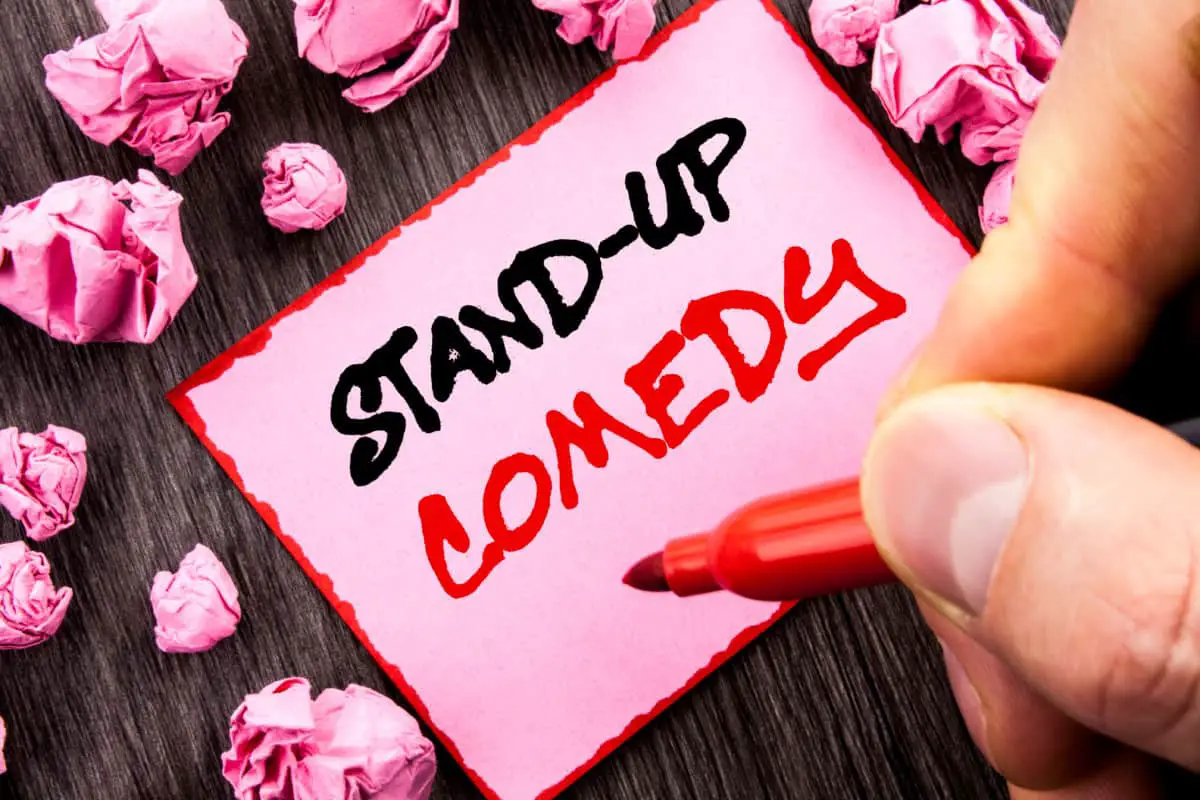Stand up comedy appears to be like magic to most people. Sometimes to even to comedians they can’t figure out if they should write everything down or just wing it. So is stand up comedy scripted, well Yes. And No.
Stand up can be difficult and intimidating and most comedians would not want to get on stage without at least a basic outline of the jokes they are planning on telling. I’ve seen several comedians go on stage with a list in hand and refer to it throughout their set. Yes, there are comedians that go on stage and perform only crowd work, but those are generally rare and often the sets are not as strong as a scripted set.
While most comedians would never hit the stage without a set list there are some comedians who improvise the set based on a premise, resulting in two variations of unscripted comedy. There are two types of unscripted comedy a comedian can perform. One is crowd work and the other is improvisation.
Crowd Work
Crowd work is when the comedian looks out into the audience and starts commenting on various audience members, or when a comedian starts asking questions to the audience in general to see what type of responses they get and tries to work with that. Todd Barry did a whole tour where he did nothing but crowd work, aptly called The Crowd Work Tour. You can watch his special and see how it did it across multiple cities.
One of the most famous comedians for purely crowd work is Jimmy Brogan who came up during the Steve Allen and worked for Jay Leno during his run on the Tonight Show. I have seen Brogan perform a few times and he can turn any response into a hilarious bit. Brogan knows how to write and how to turn a response into a joke. He is basically a comedy scientist. Check out the video below.
Improvisational Comedy
Improvisation is where a comedian gets on stage without a plan and starts trying out different ideas for jokes. A good comedian is always evolving his (or her) jokes and trying out new material. So, even with a set that is largely scripted, there will often be some sort of improv.
One of the most famous comedians known for taking a premise and turning it into a full joke without writing is Dave Chappelle. I have heard numerous stories of Dave Chappelle taking a premise (idea) on stage and turning it into a full bit in a week. No writing after or before just working it out live on stage with a full audience. To me that seems terrifying but for Chappelle it is normal. While this is amazing it is not for ever or even most comedians.
Scripting A Set
There are also comedians who have a scripted set that like to start off doing crowd work to get everyone warmed up and to create an immediate connection with the audience. This is a good plan of action as every comedian should have the skills of improvisation and the ability to do crowd work. Many people go to a comedy show hoping to engage with the comedian, while many others sit in the back and pray the comedian just tells their jokes and never looks their way.
If you’re just starting out and are unsure as to whether or not you want a scripted set, I would strongly recommend starting with a scripted set and working your way towards more improv as you feel more confident on stage. Your ultimate goal is to be comfortable on stage because that will allow you to be truly funny and connect with the audience in a hilarious way.
Mitch Hedburg is one comedian whose act was almost completely scripted. It featured one liners that stood on their own. “I have not slept for three days…because that would be too long.” It was absolutely hysterical. But let’s be honest, how many Mitch Hedburg’s are there in the world? His style was completely unique and incredibly difficult to replicate.
Another thing to remember is that with stand up jokes is that you don’t want to recite every single line the same way time after time like a Shakespearean monologue. Part of the magic of stand up is that no set is ever exactly the same, even if it’s the same jokes being told. I’ve seen Brian Regan do stand up live and then seen basically the same set on TV and (at least to some degree) they were two different sets.
Awareness Of Joke Reception
You also have to learn from each set you perform. One time my wife and I went to see Jim Gaffigan at the Greek Theater in Los Angeles and he told a joke that earned a collective groan from the audience (it was about Hitler – almost never a good idea). I thought that was a risky joke, but at least he knows it doesn’t work. Imagine my surprise when I heard him tell it again in his special! Obviously, someone as big as Gaffigan can probably get away with it, but it was a truly awful joke, and in my opinion almost ruined the set and certainly changed the vibe in the audience from very open to whatever he had to say, to immediately guarded and closed off. To this day, instead of remembering a wonderful and funny night with my wife, that is still the only moment I remember from the show.
Even if you’re very attached to a joke you wrote and think it’s gold, the audience might feel differently. You have to be able to adapt your set to what the audience wants to hear, not what you want to say. This is part of the evolving process of comedy. One question we ask other comedians on my podcast from time to time (The Clean Comedy Podcast – check it out!) is, have you ever told a joke that felt like it should work, but just didn’t? The answer is always yes. This is because what sounds funny to you when you’re writing it doesn’t always translate as well as you’d like to the audience. This is where the improv skills can really come in handy. If a joke isn’t going right, try to change it up and see what happens. Or if you’re onstage and you’ve got a better idea for a segway than the one you’ve been practicing, try it out! I’ve written some of my best jokes this way.
Reading An Audience
Since every audience has different energy, seasoned comedians will often spend a few minutes simply talking to the audience and feeling them out before they into the set that they have planned. Not only does it take up some of the time they’re required to fill on stage, it also creates a bond with the audience and can end up being very funny. It’s all about balance.
Ultimately, there is no one right way to do stand up comedy, but there are good formulas. Strong comedians should be able to have a well-planned set, and then go on stage and adapt and improvise it as needed, while also developing a unique rapport with the audience to make them feel as though this performance is something special between them and that specific audience, as though the set has been created just for them and will never happen again.

